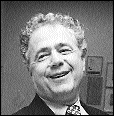Faculty Profile: Charles Altieri Is Named Director of Campus Consortium for the Arts
By Julia Sommer, Public Affairs
Posted February 24, 1999
 Charles Altieri. Peg Skorpinski photo. |
Previously named Center for the Arts, the consortium's new name should eliminate confusion with the campus Center for Theater Arts (CTA).
The Consortium for the Arts will foster interdisciplinary arts projects among academic departments, campus arts presenting organizations and the community, in the process attracting eminent scholars, artists and performers to campus, says Altieri.
The Consortium's first grants, totaling $50,000, were awarded to six campus arts projects unfolding this semester, beginning with Fete at Fontainebleau Feb. 20, a collaboration among the music, dance and art history departments.
Other Consortium-backed projects this spring include choreographer/dancer Joe Goode's residency Feb. 15-March 12, the Cal Performances production of "Peony Pavilion" March 5-7, filmmaker Johan van der Keuken's April residency and a roundtable with artist Robert Colescott May 9. In July it will present the premiere of "Serpentina," an opera by Music Professor John Thow.
"Now that the Consortium is established, we have requested considerably more funding for next season," says Altieri. "We hope to produce a wide range of programs, along with related seminars and panels."
A specialist in 20th-century poetry and visual arts, Altieri says he will be sad to leave the Department of Art Practice when his three-year appointment as chair ends in May.
"When I first joined the department, I wanted to make the art faculty more like other academics," he recalls. "Then I realized that there's great value in how they're different. Academics are trained to pounce on and overcome their vulnerabilities, while artists tend to explore theirs in their work. Both approaches are important for an institution."
Altieri will also miss having "stuff up on the walls" and the "sense of mutual responsibility in a small department."
His greatest satisfaction as chair, he says, "was probably those occasional moments when the faculty took seriously what I had to say about art." Almost as satisfying, he says, was the hiring of assistant professor Shawn Brixey, a multimedia expert, and painter/professor-in-residence Squeak Carnwath.
The Consortium for the Arts, temporarily housed in Wheeler Annex, will work to integrate campus arts events more closely with undergraduate and graduate education and with ongoing research in the arts, says Altieri. "The Consortium is committed to the proposition that if the university can attract students to events or museum shows and make such visits intellectually exciting, it will have made the arts central to the rest of their lives," he says.
With that in mind, the Consortium will offer modest funding for freshman and freshman-sophomore seminars devoted primarily to performances on campus and/or holdings in the Berkeley Art Museum/Pacific Film Archive (BAM/PFA).
The Consortium will also support residencies by notables in the arts and graduate seminars devoted to the works of visiting artists and specific arts events.
"We hope to make arts events part of the general intellectual life on campus," says Altieri. "There are few events more inspiring to students than seeing their efforts taken seriously by a world-class artist, and few needs at a major university more pressing than establishing a strong intellectual presence for the arts."
Asked why he would stray from his home department of English, Altieri says, "I am committed to developing programs that emphasize the arts as modes of sensuous thinking. The more fully we bring artists and critics together and have the various arts conversing with each other, the richer their claims on the university environment as a whole."
Altieri joined Berkeley's faculty in 1992. Before that he taught at SUNY/Buffalo (1968-75) and the University of Washington (1976-1992). He received his PhD from the University of North Carolina, Chapel Hill.
This semester he is teaching a graduate English seminar on "Theorizing the Emotions" in the hope that he will finally find a way to structure his proposed book, "Reading Affects in Poetry and the Visual Arts."
"My dream is to elaborate ways of talking about the force of works that honors their structure as objects without treating them as bearing messages that have to be decoded," he says.
The Consortium for the Arts' advisory committee includes chairs and directors from art practice, BAM/PFA, Cal Performances, CTA, the College of Environmental Design, film studies, history of art, music and the Townsend Center for the Humanities, which has served as a role model for the Consortium.
![]()
![]()
February 24 - March 2, 1999 (Volume 27, Number 24)
Copyright 1999, The Regents of the University of California.
Produced and maintained by the Office of Public Affairs at UC Berkeley.
Comments? E-mail berkeleyan@pa.urel.berkeley.edu.